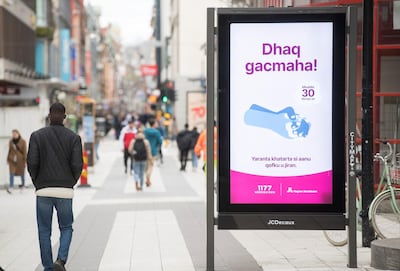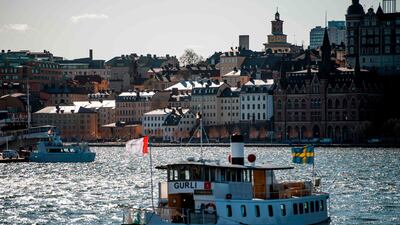Even when the outbreak remains small and relatively contained, the social impact of a coronavirus pandemic is toxic.
In Sweden the overall figures remain relatively low, but the highest incidence of the disease is occurring in the country’s Somalian community.
The Nordic nation has attracted attention for adopting a very 'culturally Swedish' response to the pandemic.
Assumptions have been made that Sweden's national characteristics can mitigate against the virus spread.
According to statistics, more than half of the Swedish population live on their own at home.
The Somali community, numbering in the hundreds of thousands, however, has a very different demographic profile.
This population is highly concentrated in Stockholm. Households tend to multi-generational – a product of the immigrant experience, but not typical in Sweden.
Far-right extremists naturally used the statistics to attack Somali victims. The country’s broadcasting authority has been spurred by the backlash, increasing minority-language messaging to get across official advice on coping with the health threat.
What should be under pressure is the unique approach the country is taking to fighting Covid-19. It has not ordered the home isolation, partial quarantine or curfews common elsewhere after infection rates soar and healthcare systems come under pressure.
Medical and scientific advice in Sweden still holds that the pandemic can be managed within society. These are the cues that guide government in Stockholm.
But scepticism that one country can stand alone grows by the day.
The situation within the Somali community flashes red to wider Swedish society, and yet there is no sign the official consensus is crumbling. If Somalis are a microcosm of where the outbreak is heading then the authorities are gambling with people’s lives.

Data tracking of movement in Sweden’s big cities shows a 75 per cent drop in traffic in recent weeks. Figures in other countries under blanket lockdowns can reach 95 per cent. Even the much-criticised British lockdown has resulted in an 85 per cent drop in movement since mid-March, according to Google data.
Swedes are advised to stay two metres apart, but not required to forsake their lifestyles. The elderly cannot go out and gatherings of more than 50 are banned. While that means the Swedish football league is suspended, it doesn’t mean that countering the virus threat has been made part of normal life.
Instead, as spring brings an end to the long dark nights, Swedes are filling cafes and the leisure spots where the cherry blossom trees are an annual treat.
Covid-19 is a disease of the human condition and is ravaging some of the densely populated parts of Europe. In those places there is a widespread consensus that society as a whole will not tolerate the levels of death that the disease threatens.
Sweden has long had a culture of rational arguments playing an out-sized role in public life. Even so, a point must come that the alarm raises among the public and overrides faith in the methodology of the bureaucrats. The spike in deaths to 333 on Friday, up 51 on the day, from 6,078 cases was a big lurch higher.
Anders Tegnell, the medic behind the Swedish strategy, has said he does not believe there is a “real connection” between lockdowns and closing borders and slowing down the infection rate. But he also added that the period of isolation was a one-time shot. “You can’t lock up people forever,” he said.
The scientific models used by other countries were only as good, he said, as the numbers inputed by the epidemiologists.
The gamble that Sweden is taking is that it can insulate itself against future waves of infection. By focusing on the need to get over the longer-term impact, the Swedes hope to preserve high constant levels of economic and social activity through diminishing waves of the virus.
Many in Sweden look at the sharp stop in other parts of the world as economic suicide. Elsewhere, economic indices dive and unemployment rates spike beyond any precedent and Swedes still hope they won’t have to make the same sacrifices.
The initial impact of coronavirus cannot be denied, but it can be mitigated. Studies of the 1918-20 Spanish flu have shown how the American cities that locked down hardest bounced back best.
Governments have become the buyers of last resort to sustain businesses and livelihoods. Sweden is well placed to buffer the shocks thrown up against developed economies but remains in denial.
The point of making the commitment is that it is total and immediate, but temporary. German economists have said the manufacturing base can survive an eight-week lockdown, but not staggered disruption.
Sweden is out of step, and its failure to embrace the single lesson of the crisis doesn’t protect its own people. It exposes the country’s Somali community as the first line of a calamity that will be much worse than it needed to have been.
Damien McElroy is the London bureau chief of The National


